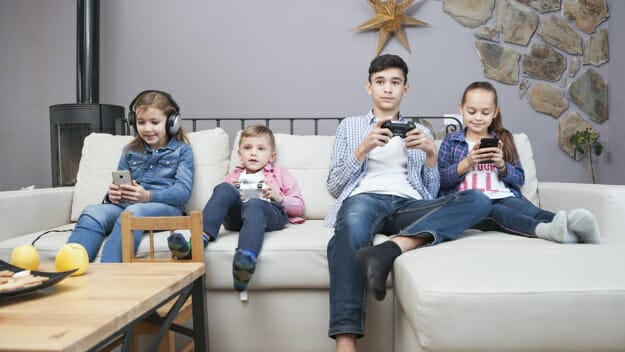Eliana Echeverry, M.A. CCC-SLP, Dena Riccio, MS, OTR/L
Screens… can you imagine 2020 without them?! We can’t! Televisions, computers, phones, tablets, video games… screens are ubiquitous in our daily lives. They are often the first thing we look at when we wake, and the last thing we look at before bed. Not only do screens give both children and parents endless options for entertainment, but in the unique circumstances surrounding the COVID-19 pandemic, screens have also become a critical tool to allow us to continue working, learning, and connecting. However, we are consequently experiencing the effects of increased reliance on-screen technology as a necessity to maintain our way of life, juxtaposed with the awareness that the increase results in significantly prolonged use and goes against daily consumption recommendations. We know it, we see it, and we feel it, and this issue is certainly a cause for concern. Hence, we’d like to address this issue from the perspectives of an OT and SLP, to answer some questions and offer some insight regarding screen use in the therapy world and beyond.
What are the biggest impacts you have seen on children’s development? Below we break down some impacts across a few areas.
Vision
Think back to when you were a kid and your parents told you, “don’t sit so close to the TV. You’re going to ruin your eyes!” They were right, but probably not for the reason they thought they were. Looking at screens close up can cause very real damage to our retina. Emerging research is demonstrating a correlation between certain retinal diseases and prolonged close exposure to screens. Close exposure is defined as anytime a screen held 2 feet or less away from the face, essentially an arms-length away. That sounds disastrous given how much time we spend on phones, tablets, and computers but the operative word here is prolonged. That being said there are also oculomotor reasons close screens are worse than distant screens (ex: TV, movie theaters). When our eyes must continually converge on a single point it forces our eyes to work harder which strengthens the muscles in the inner corners of our eyes and stretches the muscles out in our outer corner. The result I most commonly see are kids who have difficulty with scanning and saccades (rapid movements of the eyes), which can result in difficulty in reading accuracy and speed.
Motor Development
Due to the extensive amount of time spent sitting, and only engaging with our hands on buttons, you may see significant difficulty with your child’s strength, endurance, motor planning and coordination. Children are just not getting the amount of free play time they used to have indoors or outdoors to develop their motor systems. It is recommended that a child has at least 4 hours of free play time throughout their day until age 10. If there’s more time spent on a screen there is less time available to play freely. We know it might be harder to just send some of our kiddos outside to play, but remember not all play has to happen outside. It definitely takes some intentionality behind getting that playtime in, but we can certainly all use it these days. Our best advice is to get it in when you can with whatever fits your family’s needs and availability.
Social Communication
A downside to our virtual world is that these platforms make it difficult, and at times even impossible, to read body language and/or tone when communicating, which can impact how a message is interpreted and result in communication mishaps. The lag time between responses can also pose a challenge in generating a conversation that flows, resulting in a lot of start/stop, on/off interactions that require more brain power and can easily lead to frustration. There are so many ‘hidden rules’ behind texting/messaging that can impact an interaction and add yet another challenge to repairing it or ensuring that the recipient receives the message as intended.

Executive Functioning
A challenge to screen time is it can be difficult to monitor time spent and monitor when we need to shift off of these activities. Essentially electronics are instant gratification, releasing a rush of endorphins and a huge increase in dopamine in the frontal lobe. This means that technology essentially is retraining your child’s brain to respond differently to input. Instead of being curious, observant, explorational, and playful, they are trained to only engage with material that provides them with immediate reward and as a result develop a constant craving for this immediate reward. Does your kid snap at you when you tell them they have to get off their tablet? Do they act sad and mopey if they are not allowed to have their electronics? These examples of emotional dysregulations can be seen as signs of an overstimulation and or overdependence. These are big emotions for a child to deal with and can result in difficulty for both you and your child.
Additionally, increased use of screen time doesn’t allow kids to feel boredom and lean towards this constant craving of stimulation. Without time to ‘feel bored’ our kids no longer know what to do with themselves. They present with underdeveloped imaginations and decreased creative play and problem solving. We hear tons of, “I’m bored. I don’t know what to do. I’ll just wait until my tech break is over.’ They then become incessantly reliant on an adult to entertain them, which can certainly frustrate all members in the home.
Language Development
As far as language development in children, the biggest factor that contributes to language acquisition is the presence of stimulating language environments where children are engaging with adults face to face. Stimulating language environments are those situations where children are spoken to and played with. In most of the cases that we come across delays are due to unknown etiologies. The children are provided with rich language models throughout the day and given opportunities to interact with family members and peers. However, in looking at what the research is showing there is certainly a need for conscious screen time usage for young children. At this time no causation has been established but research has shown trends between increased use of screen time and the presence of speech delays. One study reported that every 30 minute of increased handheld screen time translated to a 49% increased risk for speech delay. The first few years of a child’s life are essential for not only learning language, but learning how to use language. If they spend extended amounts of times on a screen where they are not interacting with another person they are missing out on opportunities to learn the ‘how’ and ‘why’ behind communication exchanges. Now this doesn’t mean your child shouldn’t be using a screen at all, but rather it is important to look at how your child is using their screen time and how long they are spending on it.
Another study reported, low-quality television viewing (television unintended for children, background television, solitary viewing, and earlier age of viewing) in infancy was linked to smaller vocabularies. Another study surveyed over 1,000 parents of children under the age of two. They found that toddlers who watched more videos said fewer words. For each additional hour of videos that eight- to 16-month-old infants watched in a day, they said an average of six to eight fewer words. There doesn’t seem to be enough research to say there are causal relationships between screen time and language delays, but the studies certainly point us to be mindful around the use of technology as more time spent on screens without interacting with someone decreases the amount of time where the child is communicating with another individual, which is vital for language development. It is important to consider recommendations from the American Academy of Pediatrics (AAP) for screen time to set boundaries around its use, monitor our own screen usage as adults, and monitor changes in your child that you might observe occuring around screen use.
We hope you found the initial dialogue between Dena, OTR/L and Eliana, CCC-SLP helpful, and that we can all work together to establish healthy habits surrounding “screen time.” Check back in with us as we answer more questions on how to navigate screen time use over the course of our multi-part blog series.
References
1 Is screen time really bad for our eyes? (2020, April 6). Retrieved February 21, 2021, from https://www.susquehannahealth.org/in-the-community/blog/is-screen-time-really-bad-for-our-eyes#:~:text=Studies%20have%20shown%20children%20who,sensitive%20cells%20in%20the%20retina.
2 American Academy of Pediatrics (2017). Handheld Screen Time Linked with Speech Delays in Young Children. Retrieved from https://www.healthychildren.org/English/news/Pages/
Handheld-Screen-Time-Linked-with-Speech-Delays-in-Young-Children.aspx
3 Byers-Heinlein, K., & Lew-Williams, C. (2013). Bilingualism in the early years: What the science says. Retrieved February 11, 2021, from https://www.ncbi.nlm.nih.gov/pmc/articles/PMC6168212/
4 Is screen time really bad for our eyes? (2020, April 6). Retrieved February 21, 2021, from https://www.susquehannahealth.org/in-the-community/blog/is-screen-time-really-bad-for-our-eyes#:~:text=Studies%20have%20shown%20children%20who,sensitive%20cells%20in%20the%20retina.
5 Da Silva, B. (n.d.). Ipad = i don’t talk: The effects of young children’s screen time. Retrieved February 11, 2021, from http://www.hanen.org/Helpful-Info/Articles/ipad-equals-dont-talk.aspx
6 Media and children communication toolkit. (n.d.). Retrieved February 11, 2021, from https://www.aap.org/en-us/advocacy-and-policy/aap-health-initiatives/Pages/Media-and-Children.aspx
#occupationaltherapy #speechlanguagepathology #screentime #attention #executivefunctioning #vision #ocularmotor #sleep #familytime #socialmedia #gaming #languagedevelopment #motorplanning #socialemotional #regulation #familygamenight #visiontherapy #distractedkids

